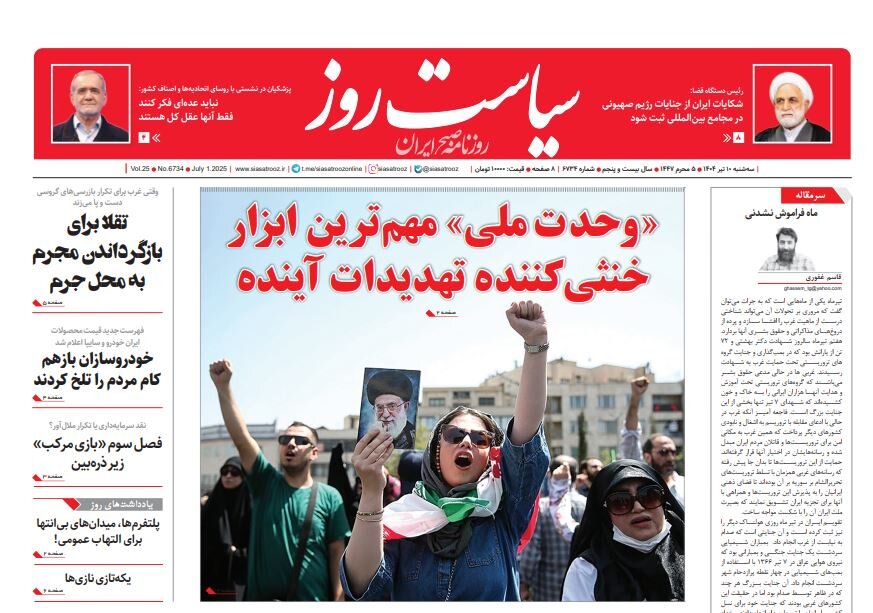‘National Unity’ is most important tool to neutralize future threats

TEHRAN - Siasat-e-Rooz devoted its headline to national unity in difficult circumstances and wrote: In recent weeks, Iran has faced one of the most complex and sensitive periods in its history.
The Zionist regime, with the open support of the United States especially its president Donald Trump, launched a large-scale operation against Iran with aim of weakening the country’s defense capabilities and creating division in Iranian society. The invasion, which included attacks on military, nuclear, and residential areas, not only sought to hit Iran's defense infrastructure, but also to incite the public to create internal unrest. Despite all these attacks, Islamic Iran, relying on its military power and social cohesion, is able to withstand the most complex external threats. Operations "True Promise III and Herald of Victory", along with participation of millions of people at the funerals of the martyrs, were manifestations of Iran's national power and determination. However, given the challenges, especially the enemy's efforts to create social division, remain serious, and maintaining national unity and vigilance against the enemy's psychological warfare will be key to Iran's success on this path.
Javan: Shameless Europe
In an article, Javan said the European trio of Britain, Germany, and France are behaving shamelessly regarding issues related to Iran’s nuclear program. It wrote: The three European countries that are members of the JCPOA have turned a blind eye to all the betrayals—especially by the IAEA—which paved the way for the Zionist regime’s invasion of Iran. They have unanimously called for Tehran's continued cooperation with this institution and return to the negotiating table, and have accused Iran of threatening Grossi. Iranian diplomats, in response to such positions, have emphasized that Iran has not threatened Grossi, but the IAEA should know that there will be no prospect of Tehran's cooperation if the current situation persists—such as new threats of military strikes on Iran’s nuclear plants, and the IAEA's continued disregard of its technical and legal duties. While Americans still disagree about how destructive the attack on Iran’s nuclear facilities was, the Europeans fully defend the performance of the International Atomic Energy Agency. In their formal reactions, Iranian officials—while criticizing Grossi’s political behavior—have only raised the issue of holding Grossi accountable for failing to fulfill his legal and technical obligations and have not made any threats against him.
Resalat: Political achievements after the war
In an analysis, Resalat reviewed Iran's achievements following Israel’s war against Iran. It stated: During the 12-day war between Iran and Israel, Iran gained political support. The discursive atmosphere of Iranophobia, created by the enemy, shifted into Iranophilia. Even the people of America and Europe, as well as the governments of Islamic, Arab, and other countries around the world, expressed solidarity and support for Iran in the face of this open aggression (by Israel and the U.S.) For the second time, America and Europe demonstrated that they are not honest at the negotiating table and aim to deceive and strike (an open reference to Israel’s and the United States’ airstrikes on Iran’s nuclear sites amid negotiations between Tehran and Washington). This experience can serve as a lesson for political officials both in Iran and abroad. Iran has practically demonstrated that it acts with power and dignity in the political arena and will not sign any agreement that does not serve its national interests. Nations that are friends and allies of Iran have distanced themselves from hostile states, and the dynamism of Iran's foreign diplomacy has been proven in action. Iran successfully defended its legitimate positions in the UN Security Council and the Board of Governors.
Ettelaat: Will Israel attack Pakistan after Iran?
Evidence suggests that Pakistan, as the only Islamic country with nuclear weapons, could be Israel’s next target. For this reason, the need for cooperation between Pakistan and Iran will be important. In recent decades, the Middle East, as the hotbed of global tensions, has repeatedly witnessed direct and indirect conflicts between regional and international actors. In the meantime, Israel, as one of the military powers in the region, has played an important role in causing these tensions. After years of focusing on Iran’s nuclear program and trying to weaken the country, recent evidence and statements indicate that Israel may turn its attention to Pakistan, the other nuclear power in the Islamic world that does not have friendly relations with Tel Aviv. Pakistan, feeling threatened by Israel, provided political support to Tehran during the Iran-Israel tensions. However, political support alone is not enough. Military cooperation with Iran can help Pakistan and Iran resist threats from Israel and its allies, especially India, and defend their national interests.
Leave a Comment